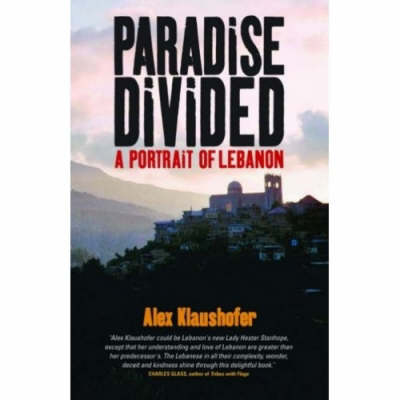
Paradise Divided
A Portrait of Lebanon
Seiten
2007
Signal Books Ltd (Verlag)
978-1-904955-35-1 (ISBN)
Signal Books Ltd (Verlag)
978-1-904955-35-1 (ISBN)
- Titel ist leider vergriffen;
keine Neuauflage - Artikel merken
Journeying through multi-faith post-civil war Lebanon, the author reveals both the faultlines and the common ground between Muslims, Christians and Druze. It chronicles the delicate web of relationships that make up contemporary Lebanese society.
This timely portrait of Lebanon exposes the fault lines that underlie the current crisis in the Middle East, and charts the country's attempts to rebuild a fragile peace after its long civil war and recent conflict with Israel. Part reportage, part travel narrative, "Paradise Divided" chronicles the delicate web of relationships that make up contemporary Lebanese society. Drawing on interviews with community leaders and relationships with ordinary people, it reveals a richly-textured social and religious fabric in which Sunni and Shia Muslims, Druze and Christians of all kinds, from Maronite Catholics to evangelical Protestants, strive to maintain a delicate balance. It offers an insight into how Lebanon's religious communities, their identities formed by history, landscape and their relationships with one another, came to be what they are today - and how their different perspectives can lead to potentially destructive tensions. What emerges is a quintessentially Middle Eastern form of coexistence, poised between tolerance and sectarianism - a theme powerfully developed through the author's privileged access to the normally secretive Druze.
The reader follows the country's changing fortunes after the assassination of former Prime Minister Rafik Hariri, the subsequent pro-democracy movement and withdrawal of Syrian forces from Lebanese soil. The final chapters examine the aftermath of Israel's military campaign and the emergence of the new battle dividing Lebanese society as opposing camps struggle to have their vision for Lebanon made reality. "Paradise Divided" opens a window onto a country little-visited by Westerners for decades, and one very different from the war-torn images of the Middle East that dominate our television screens. Offering a unique view of the struggle between sectarianism and tolerance, and the relationship between the Arab world and the West, it is a book which sheds light on some of the central issues of our time.
This timely portrait of Lebanon exposes the fault lines that underlie the current crisis in the Middle East, and charts the country's attempts to rebuild a fragile peace after its long civil war and recent conflict with Israel. Part reportage, part travel narrative, "Paradise Divided" chronicles the delicate web of relationships that make up contemporary Lebanese society. Drawing on interviews with community leaders and relationships with ordinary people, it reveals a richly-textured social and religious fabric in which Sunni and Shia Muslims, Druze and Christians of all kinds, from Maronite Catholics to evangelical Protestants, strive to maintain a delicate balance. It offers an insight into how Lebanon's religious communities, their identities formed by history, landscape and their relationships with one another, came to be what they are today - and how their different perspectives can lead to potentially destructive tensions. What emerges is a quintessentially Middle Eastern form of coexistence, poised between tolerance and sectarianism - a theme powerfully developed through the author's privileged access to the normally secretive Druze.
The reader follows the country's changing fortunes after the assassination of former Prime Minister Rafik Hariri, the subsequent pro-democracy movement and withdrawal of Syrian forces from Lebanese soil. The final chapters examine the aftermath of Israel's military campaign and the emergence of the new battle dividing Lebanese society as opposing camps struggle to have their vision for Lebanon made reality. "Paradise Divided" opens a window onto a country little-visited by Westerners for decades, and one very different from the war-torn images of the Middle East that dominate our television screens. Offering a unique view of the struggle between sectarianism and tolerance, and the relationship between the Arab world and the West, it is a book which sheds light on some of the central issues of our time.
Alex Klaushofer is a London-based journalist writing on the Middle East.
| Erscheint lt. Verlag | 19.4.2007 |
|---|---|
| Zusatzinfo | 1 map |
| Verlagsort | Oxford |
| Sprache | englisch |
| Themenwelt | Geschichte ► Allgemeine Geschichte ► Zeitgeschichte |
| Geisteswissenschaften ► Geschichte ► Regional- / Ländergeschichte | |
| Geschichte ► Teilgebiete der Geschichte ► Kulturgeschichte | |
| Sozialwissenschaften ► Soziologie | |
| ISBN-10 | 1-904955-35-5 / 1904955355 |
| ISBN-13 | 978-1-904955-35-1 / 9781904955351 |
| Zustand | Neuware |
| Haben Sie eine Frage zum Produkt? |
Mehr entdecken
aus dem Bereich
aus dem Bereich
Gewalt, Umwelt, Identität, Methode
Buch | Softcover (2024)
Spector Books OHG (Verlag)
CHF 49,95
wie Freud im Kollektiv verschwand
Buch | Hardcover (2024)
Klett-Cotta (Verlag)
CHF 34,95


